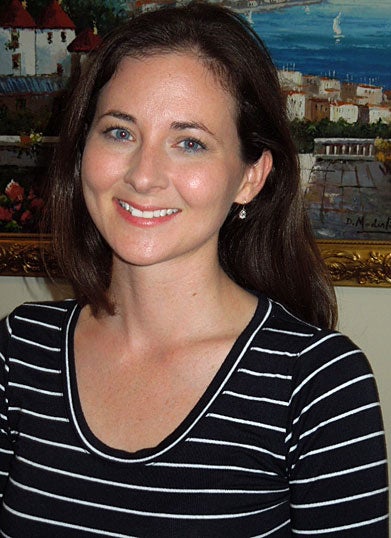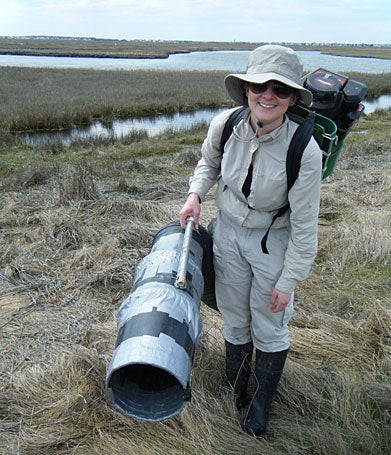Title: Doctoral Candidate, Veteran, Honored by National Science Foundation
Amy Battocletti, a second-year Ph.D. candidate in Georgetown’s biology department and a former U.S. Navy aerographer’s mate, is one of 11 veterans honored by the NSF in a ceremony today.

“I am very grateful for the NSF graduate research fellowship and feel honored to have been chosen as a recipient,” says Amy Battocletti (G’20), a second-year Ph.D. candidate in Georgetown’s biology department.
– A Georgetown graduate student is one of only 11 military veterans nationwide honored by the National Science Foundation (NSF) today in a ceremony at the organization’s headquarters.
Amy Battocletti (G’20), a second-year Ph.D. candidate in the biology department who received a three-year graduate research fellowship from NSF, served in the United States Navy as an aerographer’s mate from 2001 to 2008.
Aerographer’s mates help Navy meteorologists and oceanographers prepare Navy forces to function in any physical environment.
Solid Foundation
“I am very grateful for the NSF graduate research fellowship and feel honored to have been chosen as a recipient,” says Battocletti, who joined the military after high school. “The fellowship supports me financially and … provides a solid foundation for my career.”
NSF awards approximately 2,000 graduate research fellowships per year to doctoral-level students studying science and engineering.
Today’s ceremony honored graduate student-veterans who have dedicated their studies to STEM (science, technology, engineering and mathematics) fields.
Fighting Extinction
Battocletti conducts research at Georgetown on the impact of genetic variation within plant species in salt marsh ecosystems under Gina Wimp and Matthew Hamilton, associate professors of biology.
“Habitat loss is a leading cause of species’ extinction,” Battocletti explains. “In fragmented habitats, populations may become isolated … and are more at risk for local extinction than larger, more connected populations.”
Wimp says Battocletti’s hard work and dedication is paying off and “yielding interesting and novel results.”
Role Model
“I can say without reservation that Amy is one of the best graduate students that I have known or mentored in my career,” Wimp says. “She pursues every task with a positive attitude and without complaint, and she has been a wonderful role model for the undergraduates working in the lab. Amy is the kind of graduate student that every mentor hopes to encounter.”
Battocletti also served as a tactical meteorological and oceanographic forecaster at the Naval European Meteorology and Oceanography Facility (NEMOF) and the Naval Oceanography Anti-Submarine Warfare Detachment (NOAD) with the 6th Fleet Command in Naples, Italy.
After leaving the U.S. Navy in 2008 with a rank of First Class Petty Officer, she did her undergraduate work at the University of Rhode Island, where she majored in marine biology and wildlife and conservation biology.
Early Science Interest

Battocletti’s interest in ecology and conservation started as a child when she realized wildlife populations were declining and species were becoming extinct.
Battocletti says her parents influenced her interest in science.
Her mother took her on daily walks to observe nature, and her father, a hydrogeologist, brought rocks home for her and her brother to examine.
She got more interested in ecology and conservation when she realized wildlife populations were declining and species were becoming extinct due to human action.
Battocletti hopes to pursue a research career in ecological genetics after graduation and support conservation efforts of non-governmental organizations (NGOs) and government agencies.
“We have a responsibility to think about how our actions affect other living beings,” she says. “I’ve wondered what our descendants will think of us in the future. I decided that this was something worth dedicating my life to.”